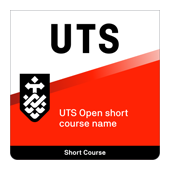Key benefits of this course
On successful completion of this course, participants should be able to:
- Demonstrate an understanding of data literacy
- Clearly communicate key concepts and relevant information from a data set to peers or colleagues.
Digital badge and certificate

A digital badge and certificate will be awarded following the successful completion of any necessary tasks or assessments to demonstrate acquired learning of the short course or for meeting attendance and/or participation requirements.
Learn more about UTS Open digital badges.
Course outline
During this short course, you will meet and work with a dedicated course facilitator who will support your learning and engagement with teaching resources designed by the lead academic and team of experts from the Faculty of Engineering and IT.
The course is structured into four modules. Each module includes self-study materials and facilitated online sessions. The modules cover the following key topics and concepts:
- What data is and the key characteristics of data
- The most common statistics used to describe data
- An understanding of uncertainty
- Correlation vs causation
- Some common errors and biases
- Basic ways to visualise data
- How to communicate a data set and its relevance to different groups
- Use cases of how different industries are using data.
The course is delivered in a scheduled format over five weeks.
For four weeks of teaching and learning, you will participate in an online session, where you will have the chance to apply what you've learnt, ask questions and hear from other participants who are taking the course with you. These workshops are led by the course facilitator.
Week five is planned to give you time to complete the short assignment, with support and a scheduled Q&A session provided.
Requirements
Mandatory
To complete this online course you will need a personal computer with adequate internet access, web conferencing capabilities and an operating system with a web browser compatible with Canvas, Zoom and Microsoft Teams.
Desired
Some professional experience and organisational knowledge in your field or role is assumed, along with basic familiarity using spreadsheets (e.g. Microsoft Excel).
Enrolment conditions
Course purchase is subject to UTS Open Terms and Conditions.
COVID-19 response
UTS complies with latest Government health advice. Delivery of all courses complies with the UTS response to COVID-19.
Contact us
For any questions on enrolment or payment, please email support@open.uts.edu.au
If you have a specific question on course content or requirements, please feitshortcourses@uts.edu.au















